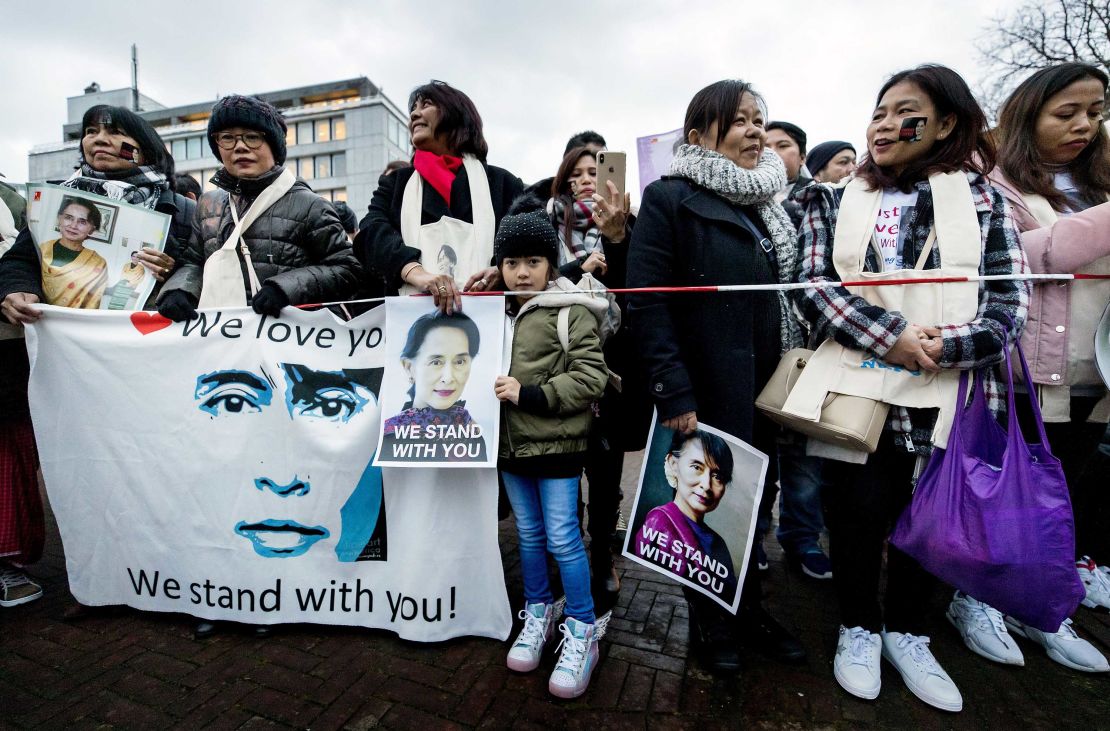Myanmar civilian leader Aung San Suu Kyi defended her government from accusations of genocide against the Rohingya community at the United Nation’s top court on Wednesday, calling the allegations “incomplete and misleading.”
Addressing the International Court of Justice (ICJ) at the Peace Palace in the Netherlands, the Nobel Peace Prize winner said that “genocidal intent cannot be the only hypothesis” regarding the Myanmar military’s operations in Rakhine state in the summer of 2017.
More than 740,000 Rohingya to fled into neighboring Bangladesh in 2016 and 2017 during the ensuing violence. Survivors have recounted harrowing atrocities including gang-rape, mass killings, torture and widespread destruction of property at the hands of the Myanmar army.
The violence has been described as genocide by a UN fact-finding commission.
The ICJ case is the first international legal attempt to hold Myanmar accountable for the Rohingya crisis. Based in The Hague, the 15 judges of the ICJ are tasked in part with settling legal disputes between states.
Suu Kyi is leading a delegation representing Myanmar at the ICJ responding to allegations brought by the tiny African nation of Gambia that Myanmar, also known as Burma, committed “genocidal acts” that “were intended to destroy the Rohingya as a group” through mass murder, rape, and destruction of communities.
Suu Kyi’s main argument rested on the premise that the country was dealing with an armed conflict in Rakhine state that was challenging the “sovereignty and security of Myanmar.”
Myanmar defense forces were responding to “coordinated and targeted” attacks on villages and police outposts from a Rohingya insurgent group called the Arakan Rohingya Salvation Army (ARSA), she said.
Suu Kyi characterized those “clearance operations” by the military as legitimate counter terror operations against the ARSA.
However, Suu Kyi did not address the alleged atrocities laid out by the Gambian delegation in the opening hearings on Tuesday, admitting only that “disproportionate force” could not be ruled out in some cases, or that the military “didn’t distinguish clearly enough between ARSA fighters and civilians.”
Suu Kyi also told the court that Myanmar’s own independent investigators had the capacity to investigate and if war crimes or human rights abuses were committed by the military or civilians, “they will be prosecuted.”

Only seven soldiers have ever been prosecuted on charges relating to the Rohingya crisis. They served less than one year of a ten-year sentence for the killing of 10 Rohingya men and boys in the village of Inn Din.
“Can there be genocidal intent on the part of the state that actively investigates?” she asked.
Following the presentation, the Global Justice Center said the picture Suu Kyi built up of an “internal military conflict with no genocidal intent” was “completely false.”
“Multiple independent agencies and experts, as well as Rohingya themselves, have documented mass killings, widespread rape, and wholesale destruction of land and property intentionally inflicted on innocent civilians. The government has discriminated against the Rohingya for decades. This is genocide and it’s precisely what the Genocide Convention set out to prevent,” Akila Radhakrishnan, Global Justice Center President, said in a statement.
Many in the international community have questioned how a Nobel laureate renowned for fighting for democracy and human rights is now justifying her government’s persecution of the Muslim minority.
Yanghee Lee, the UN Special Rapporteur on human rights in Myanmar, told CNN before the hearings on Wednesday that ever since Suu Kyi’s party the National League for Democracy came to power after winning landslide elections in 2015, she has been “singing from a different song sheet.”
“We have to be aware that there are two Aung San Suu Kyi’s in Myanmar. The Aung San Suu Kyi prior to the 2015 election and the one post 2015 elections. The one we are seeing in The Hague is post 2015,” Lee said.
The special rapporteur said that when she pushed Suu Kyi to visit Rakhine state, her access to the country was threatened.
“She repeated the phrase, ‘if you continue this narrative you may not get any access to the country’. That was when I was really appalled,” Lee said.
Domestically, Suu Kyi’s appearance at The Hague could help bolster political support at home ahead of elections in 2020 – she is still widely popular in Myanmar.
Outside the Peace Palace on Wednesday, crowds of her supporters waved banners and posters reading: “We stand with Aung San Suu Kyi”
But by defending the military’s actions in Rakhine state, Lee said, “This way she cannot erase the truth that she is complicit in genocide and responsible for genocide.”
On Tuesday, the United States tightened sanctions on Myanmar’s Commander-in-Chief of the armed forces Min Aung Hlaing, his deputy Soe Win and two other military leaders for “serious human rights abuse” in Rakhine.
The sanctions under the Magnitsky Act freeze any US assets held by those sanctioned and stops Americans from conducting financial transactions with them.






